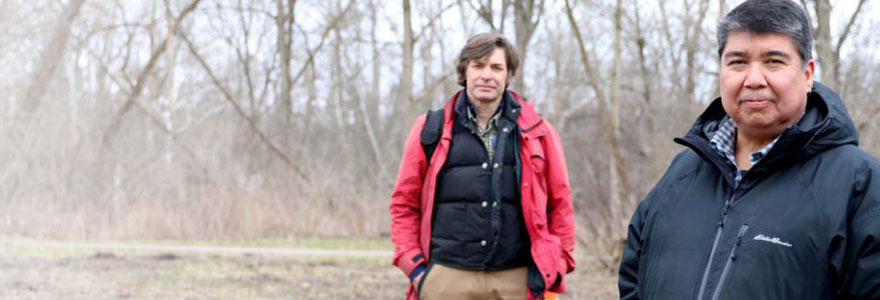News and Updates
Contact
Faculty of Social Science
Social Science Centre
Room 9438
Western University
T. 519-661-2053
F. 519-661-3868
E. social-science@uwo.ca
Students get lesson on environmental stewardship close to home
April 20, 2022
Instructors Desmond Moser (left) and Clint Jacobs are the first academic leaders to enter into a land-use agreement with Facilities Management to conduct field work with students and learn environmental stewardship. (credit: Facilities Management)
Students of a jointly offered fourth-year Indigenous Studies and third-year Geography and Environment class are leaving their legacy on campus, thanks to a new land-use agreement with Facilities Management (FM) that will provide students with learning opportunities on environmental stewardship.
The combined course, led by Indigenous studies instructor Clint Jacobs and Earth sciences professor Desmond Moser, immerses students in Indigenous perspectives on reciprocity, restoration and stewardship of the land and water.
The first land-use agreement of its kind at Western, the initiative identified several tracts of land where Jacobs’ and Moser’s class can monitor and conduct small-scale activities focused on re-establishing native vegetation and enhancing habitats.
The course was initially hosted by Jacobs’ community on Walpole Island First Nation (Bkejwanong), located southwest of Wallaceburg. During the pandemic, however, student trips to the Walpole Island First Nation were disrupted, prompting Jacobs and Moser to seek alternatives.
“To keep the course momentum going we decided to switch the lens and start to do some land healing and land responsibility here on Western’s campus,” said Moser. “As a result, students, wherever they end up in life, will take with them a sense of responsibility for stewardship and caring for the land they are on.”
With Western’s 500 acres of land, the Thames River and Medway Creek as a backdrop, students will come to know and respect the campus in a renewed context. The legacy of current students will be felt for generations through their work to reintroduce native flora, Moser said.

